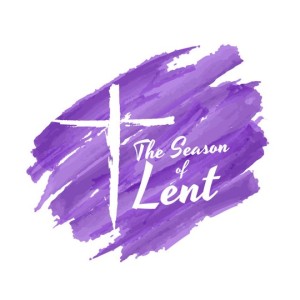Don’t panic, but LENT BEGINS NEXT WEEK!
Lent. What does it mean to you? When you say to yourself, “Lent is here,” what comes to mind? What pulls at your heart?
For me, it is exactly that, a pull at my heart to draw close to God, to confess my sins and failings, and to lean into God’s mercy, goodness, and love. This Lent I want to learn from Jesus how to draw near to God.
Where did Jesus go to pray? To a synagogue or church? Not when he wanted to be alone. When he wanted to be alone with God, Jesus found a deserted place near a river, in a desert, on mountains, or in a garden. In other words, Jesus turned to nature to help him draw near to God.
Matthew 14:23 After He had sent the crowds away, He went up on the mountain by Himself to pray; and when it was evening, He was there alone.
Nature fed Jesus’ life with God. We know this is true from texts like one above, but also from his teachings: Look at the birds in the sky; they do not sow or reap, they gather nothing into barns, yet your heavenly Father feeds them. Are not you more important than they? Can any of you by worrying add a single moment to your lifespan? Why are you anxious about clothes? Learn from the way the wildflowers grow. They do not work or spin. But I tell you that not even Solomon in all his splendor was clothed like one of them. Matthew 6:26
Only a person immersed in the beauty of creation and touched by the divine hidden within nature could write such words. St. Paul explains how this works:
Ever since the creation of the world, [God’s] invisible attributes of eternal power and divinity have been able to be understood and perceived in what he has made. Romans 1:20
This Lent, make time to pray outdoors in a garden or a park, along a river, near a pond, or on a mountain trail. Time spent in nature is very important to one’s spiritual and mental health. Many therapists encourage their clients to spend time out-of-doors as part of their treatment plan. It calms the central nervous system and lowers the heart rate as participants learn to use nature to help them relax. But there is a spiritual dividend as well. There is something about being with non-human living species – trees, flowers, shrubs, ferns, grass – that are growing, greening, and flowering, with the music and chatter of birds, squirrels, and even insects, that calms the soul and draws one into the heart of God. Nature is a sacrament, an outward sign, instituted by God that gives grace. Being in nature fed Jesus’ spiritual life, and it can feed yours.
Lent is a good time to forgive those who have hurt you.
And when you stand praying, if you hold anything against anyone, forgive them, so that your Father in heaven may forgive you your sins. Mark 11:25
Lent is the appropriate time of the year to examine the resentments, bitterness, jealousies and grudges we carry against others. Yes, we have every good reason to have these negative feelings towards others who have hurt us, abused us, undermined our good names, lied about us, etc.
But most people are confused about what forgiveness is and isn’t. Forgiving another person does not mean forgetting what he or she did nor allowing them to walk off scott free without being held accountable for his/her actions. Nor does forgiving mean reconciling with the person(s) who hurt you and becoming buddy-buddy. (Restoring trust needs to happen for reconciliation to happen.) Forgiveness is not something I do for the person(s) who offended me. Rather, it’s something I do for me. Forgiveness means that I release the poisons of bitterness and resentment, etc. that keep me from my own interior freedom and bind me to the one I haven’t forgiven. As long as I hang on to those negative feelings, to refuse to let go of my resentment, the person who hurt me still has a hold on me. Forgiveness is my letting go of those negative feelings and entrusting that person to God.
A client was sexually abused as a child by one of her parents. She repressed this awful memory for years until mid-life when certain events happened, and the memory of that betrayal hit her with a paralyzing force. There was no talking with the parent who had died. What finally set her free from the darkness was forgiving her parent. Forgiveness was her path to peace.
Use this Lent to work on forgiving the people towards whom you have feelings of betrayal, anger, resentment, bitterness, and regret. “You” might be the main person on your forgiveness list. Yes, work on forgiving yourself for the many ways you have not been the person that you wanted to be.
Lastly, do fast and give alms. When we are hungry, we experience emptiness. Fasting also creates space in our hearts for God and others. It can inspire us to share our financial resources with agencies that do the corporal and spiritual works of mercy – feeding the hungry, clothing the naked, counseling the sorrowful, instructing the ignorant, etc. We become partners in this works of mercy. This is what the book of Tobit (4:7-9) says about almsgiving:
 Give alms from your possessions. Do not turn your face away from any of the poor, and God’s face will not be turned away from you. Give alms in proportion to what you own. If you have great wealth, give alms out of your abundance; if you have but little, distribute even some of that. But do not hesitate to give alms; you will be storing up a goodly treasure for yourself in the day of adversity. Tobit:4:7-9
Give alms from your possessions. Do not turn your face away from any of the poor, and God’s face will not be turned away from you. Give alms in proportion to what you own. If you have great wealth, give alms out of your abundance; if you have but little, distribute even some of that. But do not hesitate to give alms; you will be storing up a goodly treasure for yourself in the day of adversity. Tobit:4:7-9
So, this Lent, learn from Jesus and Tobit how to have a fruitful Lent: pray in nature, forgive those who have hurt you, and give alms generously.

